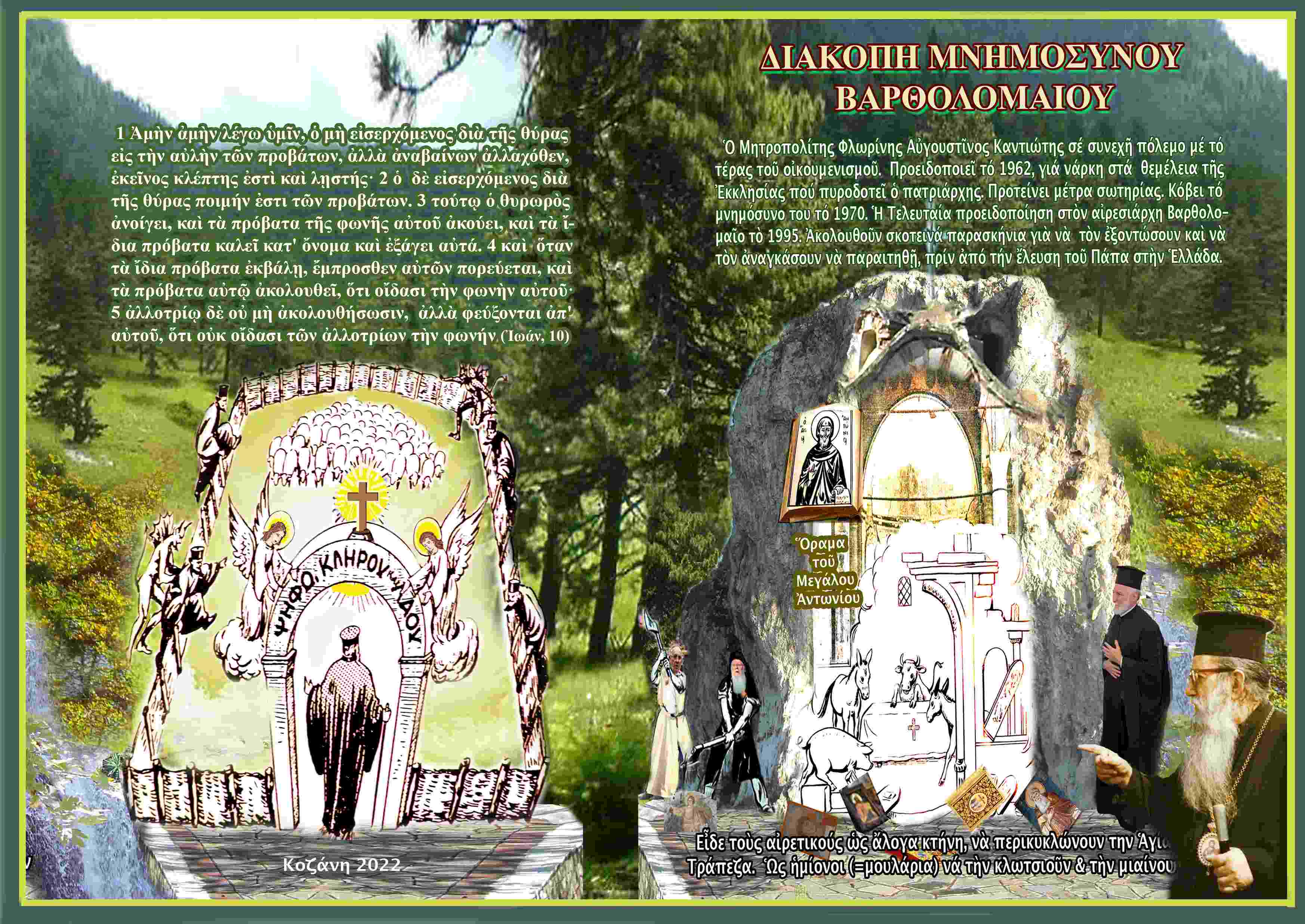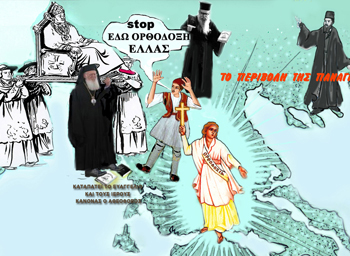1. O EΛΕΓΧΟΣ, ΑΝΑΓΚΑΙΟΣ ΣΤΗΝ ΕΚΚΛΗΣΙΑ ΤΟΥ ΧΡΙΣΤΟΥ – Need For Censure And Rebuke
O EΛΕΓΧΟΣ, ΑΝΑΓΚΑΙΟΣ ΣΤΗΝ ΕΚΚΛΗΣΙΑ ΤΟΥ ΧΡΙΣΤΟΥ
(Need For Censure And Rebuke)
Τοῦ Μητροπολίτου Φλωρίνης π. Αὐγουστίνου Καντιώτου.
Ἡ μετάφραση στὰ Ἀγγλικὰ ἔγινε ἀπὸ ἀδελφο στὴν Ἀμερική, τὸν εὐχαριστοῦμε. Τὴν παραθέτουμε παρακάτω)
Δεν αρεσκόμεθα εις το να ελέγχωμεν. Θα ήμεθα ευτυχείς, αν δεν έδίδοντο σοβαραί αφορμαί προς έλεγχον και ο λόγος μας ήτο καθαρώς διαφωτιστικός, παρηγορητικός καί εποικοδομητικός. Αλλα δυστυχώς σκληρά ανάγκη επιβάλλει την χρήσιν ελέγχου. Διότι δεν κατοικοϋμεν εις κοινωνίαν αγγέλων, οι όποιοι εΐνε άγιοι καί ακαταπαύστως υμνούν τον Θεόν. Αλλά κατοικούμεν εις κόσμον, ο οποίος κατά την Γραφήν «εν τω Πονηρώ κείται» (Α’ Ίω. 5:9). Και όσον προχωρούμεν προς την συντέλειαν του κόσμου, το κακόν θα επιτείνεται και θ’ αποθρασύνεται περισσότερον. Και πάν ό,τι άλλοτε εγίνετο κρυφίως, θα γίνεται δημοσία εν πλήρει αναιδεία και αναισχυντία και θα χειροκροτήται δαιμονιωδώς. Εις τοιούτους καιρούς ο έλεγχος, όσον δυσάρεστος και αν είνε, και όσον και αν στοιχίζη εις τον ελέγχοντα, είνε απαραίτητος, έστω και αν δεν φέρη τα αναμενόμενα αποτελέσματα, έστω και αν είνε «φωνή βοώντος εν τη ερήμω». Ο Θεός διατάσσει τον προφήτην Ιεζεκιήλ να ασκήση έλεγχον, καίτοι δεν θα εισηκούετο. Ωραίον είνε, όπως λέγει ο ιερός Χρυσόστομος, ο σφοδρότερος ελεγκτής του συγχρόνου του κόσμου, ωραίον είνε ο ποιμήν να βοσκή το ποίμνιόν του εις χλοερόν λειμώνα και παρά κελαρύζοντα ύδατα και να παίζη την φλογέραν του. Αλλ’ αν εμφανισθή ο λύκος, τότε ο βοσκός αφήνει την φλογέραν και πλήρης ορμής αρπάζει την σφενδόνην και εκσφενδονίζει λίθους εναντίον του λύκου. Καιρός παντί πράγματι. Καιρός φλογέρας, αλλά και καιρός σφενδόνης.
Ο έλεγχος συνιστάται υπό της Γραφής. Και προ πάντων είνε καθήκον των πνευματικών ποιμένων και οδηγών. Ο απόστολος Παύλος, γράφων προς τον έπίσκοπον της Εφέσου Τιμόθεον, παραγγέλλει· «Έλεγξον, επιτίμησον, παρακάλεσον» (Β’ Τι. 4:2). «Τους αμαρτάνοντας ενώπιον πάντων έλεγχε, ίνα και οι λοιποί φόβον έχωσι» (Α’ Τι. 5:20). Ο ίδιος δε ο Παύλος, όπως βλέπομεν εις τας Πράξεις καί εις τας Επιστολάς του, ήλεγχε και εκαυτηρίαζε, αλλά και αφώριζε και παρέδιδεν εις τον Σατανάν προς βασανισμόν καί σωφρονισμόν πρόσωπα, τα όποια εξετρέποντο εκ της τροχιάς της πίστεως και της ηθικής ζωής και προεκάλουν δημόσιον σκανδαλισμόν. Ο Ι. Χρυσόστομος, παρατηρών εκείνους, οι οποίοι εσκανδαλίζοντο εκ του ελέγχου και δεν συνεφώνουν προς τον ελεγκτικόν λόγον, έλεγεν: 0ι θρασεϊς αμαρτάνουν δημοσίως. Ψεύδονται, κλέπτουν, αδικούν, καταπατούν θείους και ανθρωπίνους νόμους, βλασφημούν τον Θεόν, διασαλεύουν την ηθικήν τάξιν. Και εγώ να μη τους ελέγξω; Πώς θα συγκρατηθή το κακόν; Δια τούτο έγιναν τα άνω κάτω καί τα κάτω άνω, διότι ούτε ελέγχομεν, ούτε ελεγχόμεθα, λέγει επίσης ο ιερός Πατήρ. Ο δε Σωκράτης έλεγεν, ότι βίος ανεξέλεγκτος είνε βίος αβίωτος. Ήσκησε δε καυστικόν και εκτεταμένον έλεγχον των συγχρόνων του. Και δια τον έλεγχον εμισήθη υπό αρχόντων και κατεδικάσθη εις τον διά κώνειου θάνατον.
Ο έλεγχος αναγκαίος. Υποδείγματα δε ελέγχου υπάρχουν εις την Γραφήν. Διό και ο Παύλος λέγει: «Πάσα γραφή θεόπνευστος και ωφέλιμος προς διδασκαλίαν, προς έλεγχον, προς επανόρθωσιν, προς παιδείαν την εν δικαιοσύνη» (Β’ Τιμ. 3:16). Ακούετε τι λέγει ο Απόστολος; Η Γραφή είνε «ωφέλιμος προς έλεγχον». Τι σημαίνει τούτο; Όπως ο καθρέπτης είνε χρήσιμος προς έλεγχον της εξωτερικής μορφής καί εμφανίσεως του ανθρώπου, ούτω και η Γραφή, πνευματικός καθρέπτης, είνε χρήσιμος προς έλεγχον της πνευματικής μορφής και εμφανίσεως του ανθρώπου, διά να βλέπη δηλαδή ο άνθρωπος την αρετήν και την κακίαν εις όλας τας εκφάνσεις των και εκδηλώσεις. Εις την Γραφήν η αρετή τιμάται, έστω καί αν ασκήται από τον πλέον ταπεινόν και άσημον της γης. Η δε κακία ψέγεται και τιμωρείται, έστω και αν παρατηρήται εις την ζωήν των μεγάλων και των ισχυρών της γης. Η Γραφή δεν γνωρίζει προσωποληψίαν. Όπως ο καθρέπτης δεν κολακεύει, αλλά δεικνύει την μορφήν όπως είνε, όσον άσχημος καί αν εΐνε, και εις οποιονδήποτε και αν άνήκη, έστω και αν άνήκη εις τον ισχυρότερον άρχοντα, ούτω και η Γραφή δεν κολακεύει. Ελέγχει τον ταπεινόν της γης, ελέγχει και τον ανώτατον άρχοντα. Πάς άνθρωπος, εις οιανδήποτε εποχήν και αν ζή, εντός του πνευματικού καθρέπτου, ο οποίος λέγεται Γραφή, δύναται να ίδη την πνευματικήν κατάστασίν του και μορφήν, διότι εις την Γραφήν υπάρχει το ανάλογον παράδειγμα, ο παράλληλος βίος. Δια τον λόγον τούτον μοχθηροί καί κακεντρεχείς, άπιστοι καί άθεοι μισούν καί αποστρέφονται την Γραφήν. Δεν υποφέρουν τον έλεγχαν της ζωής των από την Γραφήν. Και ομοιάζουν με την διαβόητον αρχαίαν πόρνην Λαΐδα, η οποία, όταν εγήρασε και είδεν εις τον καθρέπτην τας ρυτίδας και την ασχημίαν της, έξωργίσθη καί κατέστρεψε τον καθρέπτην! Και εκείνος μεν ο καθρέπτης κατεστράφη. Αλλ’ η Αγία Γραφή είνε ο ασύντριπτος καθρέπτης των αιώνων.
Need For Censure And Rebuke
We do not take pleasure in censuring. We would be happy, if serious occasions for censure were not given and our discourse was purely enlightening, consoling and edifying. But unfortunately a hard need compels the use of censure. For we don’t dwell in a society of angels, who are saints and unceasingly hymn God. But we dwell in a world, which according to Scripture “lies in evil” (1 john 5:9).
And as much as we advance towards the end of the world, the evil expands and grows more impudent. And everything that at other times was done secretly, will be occurring publicly in full impudence and shamelessness and it will be applauded demonically. In some such times censure, however distasteful as it might be, and however much it costs the censurer, is indispensable, even if it doesn’t bring the expected consequences, even if it is “a voice crying in the wilderness.” God commands the prophet Ezekiel to exercise censure, even though he would not be heard. It is nice, as sacred Chrysostom says, the most powerful censurer of his time, it is nice for the shepherd to shepherd his flock in a green pasture and by sounding waters and to play his flute. But if a wolf appears, then the shepherd leaves the flute and full of surgence grabs the slingshot and slings stones against the wolf. There is a time for everything. There is a time for the flute, but also a time for the slingshot.
Censure is recommended by Scripture. And above all it is the duty of spiritual shepherds and guides. The apostle Paul, writing to the bishop of Ephesos Timothy, charges: “Censure, admonish, exhort” (2 Tim. 4.2). “Censure those who have sinned before all, in order that the rest have fear, too” (1 Tim. 5.20). Paul himself, as we see in Acts and in his epistles, censured and was caustic, but also excommunicated and gave up to Satan for torturing and rehabilitation persons, which deviated from the line of the faith and of moral life and provoked public scandal. Sacred Chrysostom, observing those who would be scandalized by the censure and did not agree with the censuring discourse, would say: The impudent sin publicly. They lie, steal, inflict injustice, trample underfoot divine and human laws, they blaspheme God, they shake up the moral order. And I won’t censure them? How will the evil be contained? This is why things became upside down and downside up, because we neither censure, nor are we censured, says, moreoever, the sacred Father. Now Socrates used to say, that the unexamined life is not worth living. And he exercised caustic and extended censure of his contemporaries. And for his censure he was hated by rulers and was condemned to death by hemlock.
Censure is necessary. And examples of censure exist in Scripture. Therefore Paul also says: “All scripture is god-inspired and beneficial towards teaching, towards censure, towards correction, towards chastisement (paidia) in justice” (2 Tim. 3:16). Do you hear what the Apostle says? Scripture is “beneficial towards censuring”. What does this mean? Just as a mirror is useful for the censure, or control, of the external figure and appearance of a person, so also Scripture, a spiritual mirror, is useful for the censure of the spiritual form and appearance of a person, that is, so that a person sees virtue and vice in all its manifestations and expressions. In Scripture virtue is honored, even if it is practiced by the most humble and obscure person on earth. And vice is castigated and punished, even if it is observed in the life of the great and powerful of the earth. Scripture doesn’t know partiality towards persons. Just as the mirror doesn’t flatter, but shows the figure as it is, however ugly as he might be, and to whomever it might belong, even it belongs to the most powerful ruler, thus also Scripture doesn’t flatter. It censures the humble person of the earth, and it censures the highest ruler. Every human being, in whatever epoch that he may live, within the spiritual mirror, which is called Scripture, is able to see his spiritual state and form, because in Scripture there exists the analogous example, the parallel life. For this reason the malicious and those who take pleasure in the misery of others, unbelievers and atheists hate and turn away from Scripture. They cannot bear the censure of their life from Scripture. And they are like unto the notorious ancient prostitute Laida, who, when she grew old and saw in the mirror her wrinkles and ugliness, became wrathful and destroyed the mirror! And that mirror on the one hand was destroyed. But, on the other, Holy Scripture is the unbreakable mirror of the ages.
+ Bishop Augustinos, 1983


 Ιούλ 7th, 2016 |
Ιούλ 7th, 2016 |  Filed under:
Filed under: 

Add A Comment
You must be logged in to post a comment.